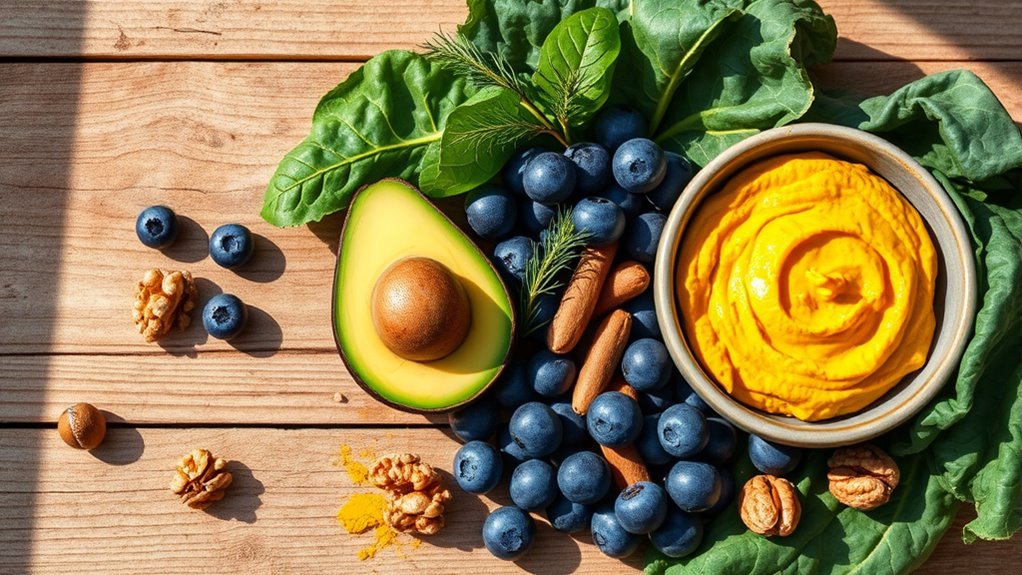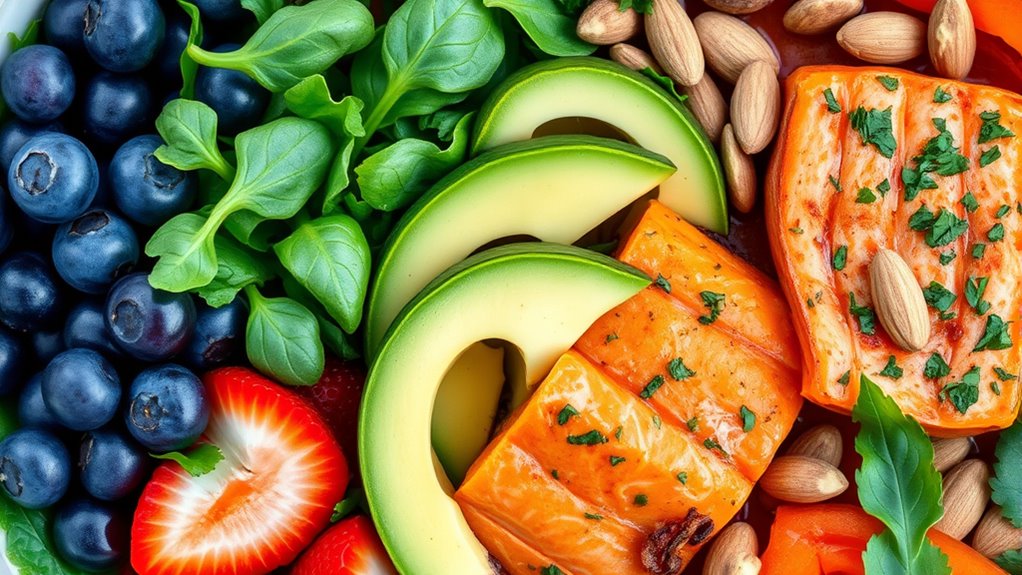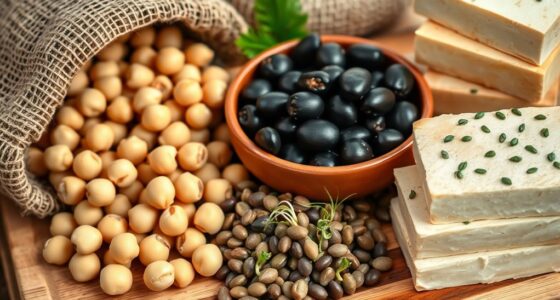To fight inflammation, focus on foods like fruits, vegetables, whole grains, nuts, and lean proteins. Incorporate herbs and spices such as turmeric, ginger, and garlic, which contain compounds that help reduce chronic inflammation. Olive oil and other healthy fats support your immune system. By making these choices part of your daily meals, you’ll boost your overall health and resilience. Keep going to discover simple ways to add these powerful ingredients to your diet.
Key Takeaways
- Incorporate Mediterranean staples like olive oil, nuts, fruits, and vegetables for their antioxidant and healthy fat content.
- Use anti-inflammatory spices such as turmeric and ginger to reduce inflammation and support immune health.
- Include whole grains, legumes, and lean proteins to provide fiber and phytochemicals that lower inflammation.
- Season dishes with garlic and herbs to enhance flavor and boost anti-inflammatory properties.
- Practice mindful eating and focus on whole, natural foods to promote long-term health and reduce chronic inflammation.

Have you ever wondered how your diet influences inflammation in your body? The foods you choose can either promote or reduce inflammation, impacting your overall health and risk of chronic diseases. One effective way to combat inflammation is by incorporating anti-inflammatory foods into your meals, especially those rooted in the Mediterranean diet. This diet is famous for its emphasis on natural, whole foods that naturally fight inflammation. Staples like olive oil, nuts, fresh vegetables, and fruits form the backbone of this approach. These foods are rich in antioxidants and healthy fats that help lower inflammatory markers in your body. By focusing on Mediterranean staples, you’re fueling your body with nutrients proven to reduce chronic inflammation and support heart health, brain function, and joint comfort.
Eating Mediterranean staples like olive oil, nuts, fruits, and vegetables helps reduce inflammation and boost overall health.
Spices and herbs are another powerful tool in your anti-inflammatory arsenal. Unlike processed seasonings, natural spices like turmeric, ginger, garlic, cinnamon, and cayenne contain bioactive compounds that actively combat inflammation. For example, curcumin in turmeric has been extensively studied for its ability to suppress inflammatory pathways. Ginger contains compounds that inhibit prostaglandins and cytokines, reducing pain and swelling. Garlic offers allicin, which has anti-inflammatory properties, helping your immune system stay balanced. Incorporating these spices and herbs into your daily cooking can markedly lower inflammation levels. Plus, they add flavor without extra calories or unhealthy additives, making your meals both delicious and health-promoting.
When you make these choices, you’re not just seasoning your food; you’re actively supporting your body’s natural defenses against inflammation. Using Mediterranean staples like whole grains, legumes, and lean proteins enhances the anti-inflammatory effect. These foods provide fiber and phytochemicals that help regulate immune responses and keep inflammation in check. Spices and herbs, on the other hand, serve as potent anti-inflammatory agents that can be easily integrated into your recipes. For instance, adding turmeric to roasted vegetables or stirring ginger into tea makes it simple to enjoy their benefits daily. These natural ingredients work synergistically to reduce inflammation, helping you feel more energetic, less sore, and healthier overall. Additionally, understanding the role of mindful eating can further enhance the benefits of an anti-inflammatory diet by promoting better digestion and nutrient absorption.
Incorporating Mediterranean staples along with a variety of spices and herbs into your diet is an accessible, flavorful way to fight inflammation. It’s not about drastic changes but about making smarter choices that support your well-being. When you prioritize whole, natural foods and spice your meals thoughtfully, you give your body the tools it needs to stay balanced and resilient. Over time, these small adjustments can lead to significant improvements in your health, decreasing your risk for chronic conditions linked to inflammation. So, start experimenting with Mediterranean ingredients and flavorful spices today, and enjoy the benefits of an anti-inflammatory approach designed to keep you feeling your best.
Frequently Asked Questions
Can an Anti-Inflammatory Diet Help With Autoimmune Diseases?
Yes, an anti-inflammatory diet can help with autoimmune diseases by supporting your immune system and reducing inflammation. When you choose foods rich in antioxidants, omega-3 fatty acids, and fiber, you can help modulate your autoimmune response and decrease inflammation. While it’s not a cure, this diet may ease symptoms, improve your overall health, and potentially slow disease progression by targeting inflammation reduction.
Are Supplements Necessary Alongside an Anti-Inflammatory Diet?
Supplements might seem like magic pills, but they aren’t always necessary. If you’re eating a nutrient-rich anti-inflammatory diet, you may get all the benefits without them, preventing nutrient deficiencies that could sabotage your health. However, if your diet falls short or you have specific health issues, supplements can fill in the gaps. Always check with your healthcare provider first to make sure you’re using them safely and effectively.
How Long Does It Take to See Benefits From This Diet?
You can start noticing benefits from an anti-inflammatory diet within a few weeks, but timeframe expectations vary due to individual variation. Some people experience reduced inflammation and improved energy in as little as 2-4 weeks, while others might take longer. Consistency is key, so stick with it, and over time, you’ll likely see better overall health, less pain, and improved immune function.
Can Children or Pregnant Women Follow an Anti-Inflammatory Diet?
Like a guiding star, an anti-inflammatory diet can benefit children and pregnant women when carefully planned. You should focus on pediatric nutrition and pregnancy safety, choosing nutrient-rich, whole foods. Consult healthcare providers or a registered dietitian to guarantee it’s appropriate, especially during pregnancy. With proper guidance, you can help both children and moms reduce inflammation and support overall health, making this diet a safe, supportive choice for the whole family.
Are There Any Foods to Avoid Completely on This Diet?
You should avoid processed foods and refined sugars on an anti-inflammatory diet. These foods can trigger inflammation and counteract the benefits you’re aiming for. Stay away from sugary snacks, sodas, fast food, and packaged items with artificial ingredients. Instead, focus on whole, nutrient-dense foods like fruits, vegetables, nuts, and lean proteins. Cutting out processed and sugary foods helps reduce inflammation and supports your overall health.
Conclusion
By embracing an anti-inflammatory diet, you can help your body fight off inflammation and boost your overall health. Think of it as your modern-day armor, much like a knight’s shield in a medieval tale—only this time, your weapon is wholesome, delicious foods. Stick to fresh fruits, veggies, and healthy fats, and you’ll be well on your way to feeling better. So, start today and turn your kitchen into a fortress against inflammation!









